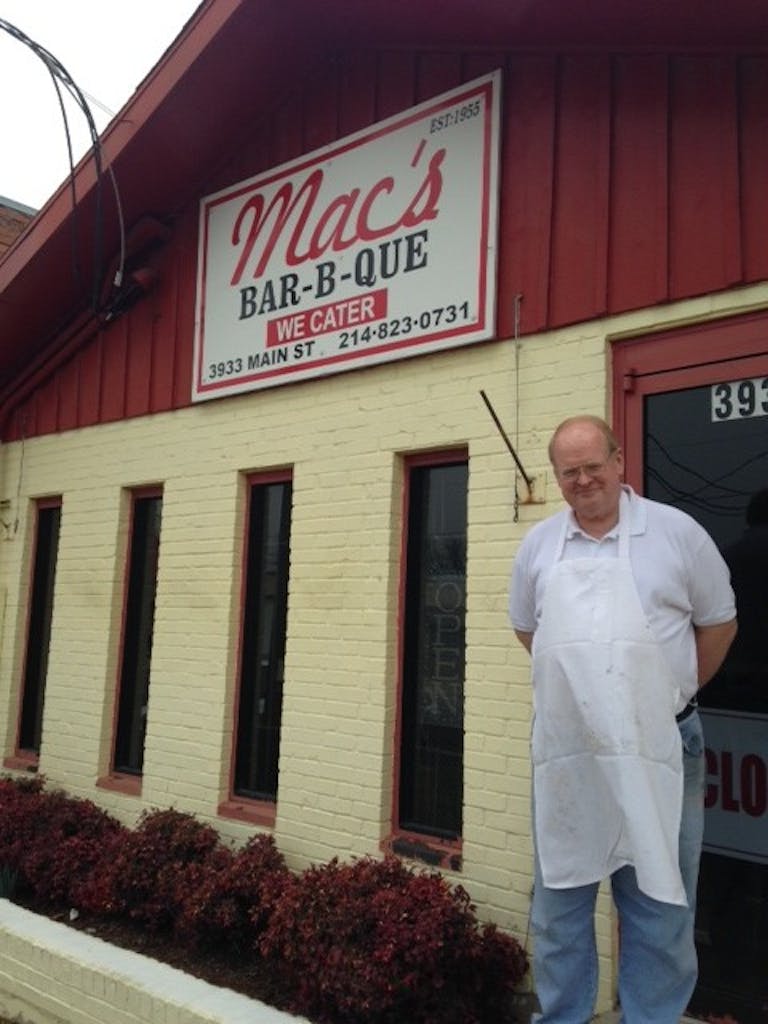Owner/Pitmaster: Mac’s Bar-B-Que; Opened 1955 (1982 in current location)
Age: 60
Smoker: Indirect Heat Wood-Fired Pit
Wood: Hickory
Billy McDonald is a second generation pitmaster at Mac’s Bar-B-Que in Dallas. Last week we ran the first part of the interview with Billy that featured his father’s career in barbecue. It wasn’t until they moved to their current building in 1982 that Billy became an aspiring barbecue man. He had a much different plan for his life when he left for college at Texas A&M, but the hickory smoke drew him in. After his father retired, Billy took the reins and really transformed the menu from one that reflected mid-twentieth century barbecue tastes, to one that is more familiar to today’s barbecue fan. You’ll be surprised to learn how long Mac’s held out on serving pork ribs, and more surprised at the famous chain restaurant that took french fry lessons from Billy.
Daniel Vaughn: Was the building here when you bought this property back in 1982?
Billy McDonald: No. It was a used car lot. I had gone to architecture school at A&M, and I drew the plans for this building.
DV: You were an architect?
BM: I had an architecture license and an engineering license. I had a degree for mass steel construction work like for bridges, but when I got out of school nobody wanted to hire a kid right out of college.
DV: Did you have to design build around that big pit in the back?
BM: No. We put in a 4’-0” door. The pit came in in 1985. We had another metal pit with sliding doors before. It lasted from 1967 to 1985. It was burning up. Everyone thinks this was a Bewley pit, but it’s not. Bewley copied this design. There are more baffles to keep the heat from going directly into the cooking chamber. It was a custom built pit from Charlie Barks. He worked for Bewley at one point.
DV: Did you do a lot of the construction work yourselves?
BM: We hired all the contractors. I built each one of the roof rafters myself.
DV: Has it always looked like this with the paneling and the brick?
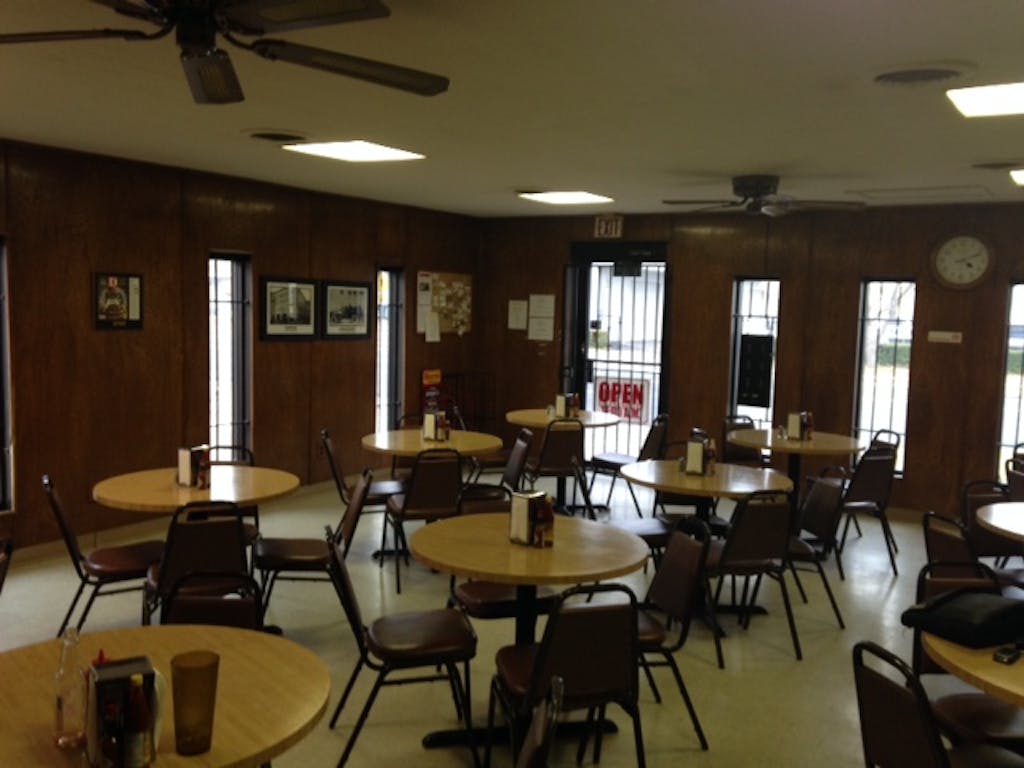
BM: Yes. The floor here in the dining room is from 1982. We were broken into over Labor Weekend in 1998 and we had to shut down for two weeks. They tore the back end of the walk-in cooler completely off. That’s how they got in. I had to have a new walk-in built. That was a rebuild year for us. We did a complete rebuild from the counter on back.
DV: What was on the menu when you opened up here?
BM: When this place opened here, it was sliced and chopped beef, ham, sausage, ranch style beans, potato salad, cole slaw, and French fries. It’s been beef, ham, and sausage until I changed it up starting in about 1995. I officially took over the business from my dad in 1992. I added baked potatoes in 1995. Ribs came along in 1998. We’ve been working with pretty much the menu I have now since then. I added jalapeno hot links about six years ago. I have tried pulled pork, but the thing is if you cook it that day, you have to serve it that day. The next day it ain’t worth a damn.
DV: So you made quite a few changes.
BM: I had to. I had to compete with the cafeteria style barbecue joints like Big Al’s and Dickey’s.
DV: So where is the free soft serve?
BM: I don’t have room for it.
DV: How long did your dad work with you after you took over?
BM: He worked here, but it was part time only.
DV: When did he pass away?
BM: 2000. I don’t like Christmas very well because he passed away on Christmas Eve. Christmas isn’t a fun time anyway. Around that time you’re fixing food for other people’s parties. It doesn’t feel like you’re celebrating.
DV: So when do you celebrate?
BM: It’s been about ten years, but we used to go down to Curacao to go scuba diving. I do underwater photography. If I had the money I’d build a house down there and retire.
DV: Your mom worked here when I started coming in. How long did she work at the barbecue joint?
BM: She worked in the business since about 1965. We went to lunch one day to the barbecue joint and dad’s waitress didn’t show up. Dad told her she needed to be the waitress that day, so she waited tables all day. She kept doing it and made about $40 a week in tips. She worked with me for a long time. Deb [Schultz] lost her job in 2006. She got laid off and I asked if she wanted to work with me. It’s a tag team now.
DV: Do you ever go out eat anyone else’s barbecue?
BM: We go make our rounds, but it’s less about the barbecue and more to see what prices are. I’m on the low end. I’ll probably have to change mine next month if briskets keep going up.
DV: Are you ever going to reprint a new one, or just keep taping over this one?
BM: What’s wrong with it? Do you want to know how much a beef plate cost when we opened here [as he peels back the layers of taped-over prices]. $7.99. Now it’s $10.99.
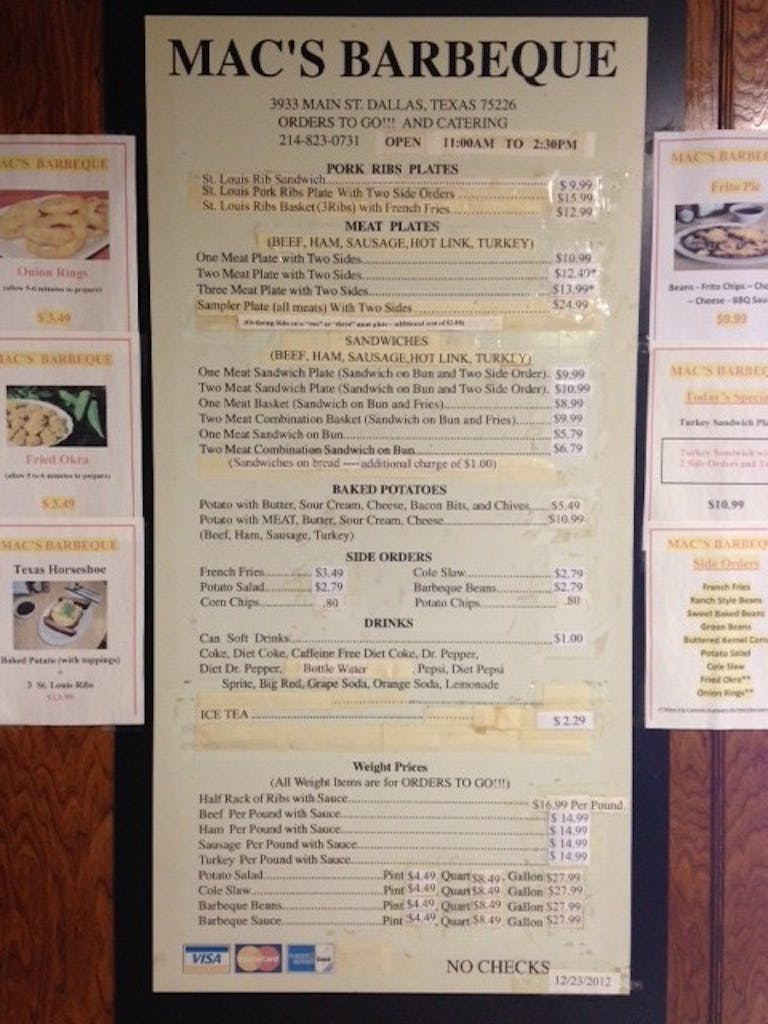
DV: In addition to the barbecue, you’ve also gained some notoriety because of your fries. I saw an interview with Larry Lavine who started Chili’s where he said they asked you for help when they couldn’t get their fries right before opening the first Chili’s. Is that true, and what’s your secret?
BM: Fresh raw potatoes, a real nice hand peeler, a color television set, some coffee and plenty of time. You peel the potatoes. Don’t leave any peel on because it sours the oil. Slice them with a French fry cutter, and put them in a bucket of water. There’s some surface starch there that needs to be washed off. Let them drain. Cook them in soybean oil for about seven minutes. It’s a pre-cooking thing. Let them rest for an hour or two. Come back and put them back in the fryer until they’re brown and crispy like you want them. No salt, no spices, no nothing except raw potatoes.
DV: You just don’t like salt in this place, huh?
BM: I have it on the table.
DV: Did Chili’s end up going with your recipe?
BM: For a while. The word I got back was that they were too labor intensive. Not everything can be bought in a box. The finished product at a five-star restaurant is because of somebody’s effort. I consider my fries of that quality. It’s always from fresh potatoes. There’s nothing frozen.
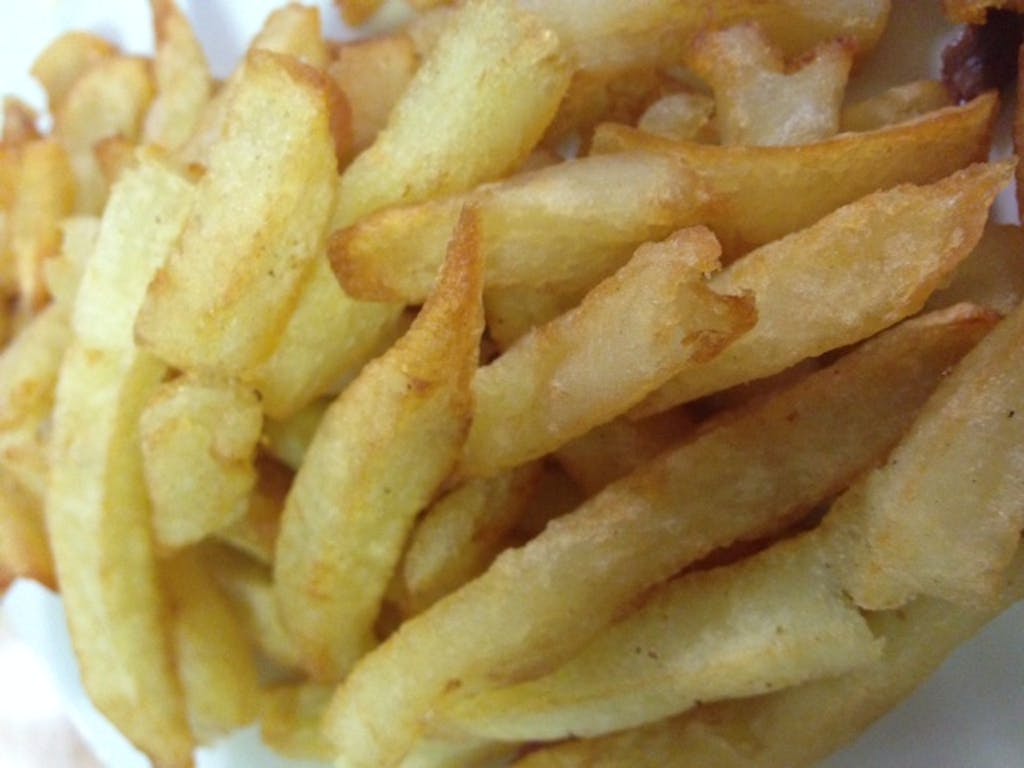
DV: I’ve never known you to be open for dinner or on the weekends. Have the hours always been at lunch time Monday through Friday?
BM: Mostly. We’ve tried evenings and weekends over a couple years and went broke over that. We just couldn’t get it to work.
DV: When did the shift from navels to briskets take place?
BM: Mid-sixties. All of a sudden there were no more navel ends, and you had these briskets. The packing houses decided they could make more money selling those.
DV: What was the cost difference then?
BM: Navels were six or seven cents per pound and brisket was fifteen cents.
DV: So it was a forced change then?
BM: Yes.
DV: Was the brisket served sliced or chopped or both back then?
BM: Back in those years it was chopped. Sliced is pretty new. Barbecue in Texas was chopped up with sauce, relish, and onion. That was it.
DV: Were the briskets boneless then?
BM: Yes, but they didn’t come in their own plastic packages. They came in a heavy-duty box and were wrapped just in butcher paper. They were fresh. The briskets still had the deckle on. You could place it in the pit and that fat layer would protect it. You wouldn’t burn it. In the last three or four years we can’t buy that product anymore. It was a 119, a whole brisket with the deckle still on. You can only buy 120’s today. I grew up smoking, well I don’t call it smoking so make that barbecuing 119’s for twenty some years. With the 120’s I make a little pan out of foil for the briskets. It’s keeps the bottom from drying out and burning. If you don’t do it, it’s a piece of shoe leather. It ain’t worth crap. We’ve all had to go through a learning process, you had to relearn how to cook.
DV: Why do you call it barbecuing instead of smoking?
BM: Smoking isn’t barbecuing. Smoking is when you’re taking a cured meat like ham or bacon and you’re under two hundred degrees. You’re introducing a heavy smoke. Barbecuing is when you cook meat at above two hundred. When I fire up the pit in the morning it’s at three hundred degrees with a light smoke. That’s barbecuing. I don’t smoke meat here. I cook with a light smoke.
DV: Do you season the meat with anything?
BM: No. It’s strictly right out of the pit. Why do you need to put seasoning on your meat if you’re buying good quality meat? It’s the same with sauce. If you have good meat, you don’t need sauce. You come here to taste the meat.
DV: Let’s talk about sauce. You’ve got a pretty good one. When I was talking with Big Al I noted the similarities between your sauces.
BM: Right, because my dad gave him a sauce recipe. Anything else you need to know? That’s what they call a cattleman’s barbecue sauce recipe. It’s not the Cattleman’s sauce that you buy at the grocery store. That sauce has been around since when Jetton was in Fort Worth.
DV: What did you know of Walter Jetton at the time? What was his local reputation?
BM: He could do the big jobs that nobody else could do. Five, ten, fifteen thousand people. He had the equipment that he could get everything cooked and get everyone a plate of food. He was the exclusive caterer to LBJ. They did the catering at the Astrodome when LBJ went down there with the fan dancer [Sally Rand] to get NASA into Houston.
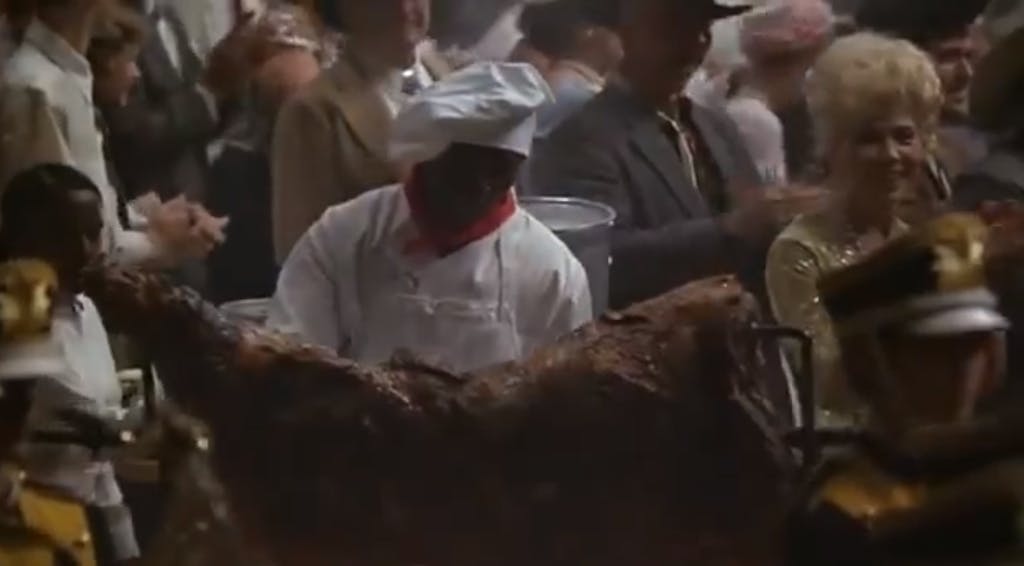
DV: Fan dancers?
BM: Yeah. Very risqué. You have to understand that burlesque and barbecue went hand in hand in Dallas. When you had a convention here they went to the Cotton Club or Johnny’s Show Palace to see the fan dancers. They would have barbecue. They didn’t have steaks.
DV: Fan dancers and barbecue just went together I guess?
BM: They did.
DV: Back to Jetton, I watched a video of one of his big events with LBJ and the Mexican ambassador where he had a whole steer on a spit. He was mopping it when busloads of people arrived, but it was nearly raw. Not one of those people ogling at the steer were going to get a bite of it.
BM: That’s right. You know, that’s the show. We did a thing back here in the eighties. A Chinese group was here in Dallas for six months. The Natural History Museum in Fair Park brought in all these Chinese artists. The director had a barbecue at his house. He wanted us to have a whole pig on a spit. It took two days to cook that pig back in that pit. We took it out to the house, but it was only for decoration. They told us ONLY for decoration. We had cooked fresh pig shoulder to serve them. All the Chinese were sitting there eating and looking at this big pig. The director told us after the meal that they wanted some of that whole pig. We said it was no problem and my dad and I took it over to the table. We started cutting it up and we had a line of Chinese there with their plates. That’s all they wanted, and there was nothing left of that pig.
DV: Have you ever cooked a whole steer?
BM: I have twice. It’s three days of hell.
DV: It sounds like hard work.
BM: Yes. Barbecue is hard work. Next month I’ve got to do a pit clean out. You get that soot on your hands and you face, in your ears and nose. You get it in your hair and in your pores. It takes about two days of bathing to get that smell out after a good pit cleaning.
DV: How often does that happen?
BM: I do it about every six months. A seasoned pit needs to breath, and every time you fire it up a little more cakes on. You have to open the pores of the steel.
DV: What is your daily routine here?
BM: At around 5:30 or 6:00 we come in and I hang my flag outside. I fly the U.S. flag and the Texas flag. [Deb] comes in and gets stuff ready. I get the pit ready. We get everything done around 9:30. That’s when I start my bleach wipe down. If you don’t do that you get a built-up layer of grease.
DV: Are all the sides made here too?
BM: Yes. It’s hand chopped cole slaw. I make my potato salad every day. The beans are made every other day.
DV: I love those beans, and that bean juice.
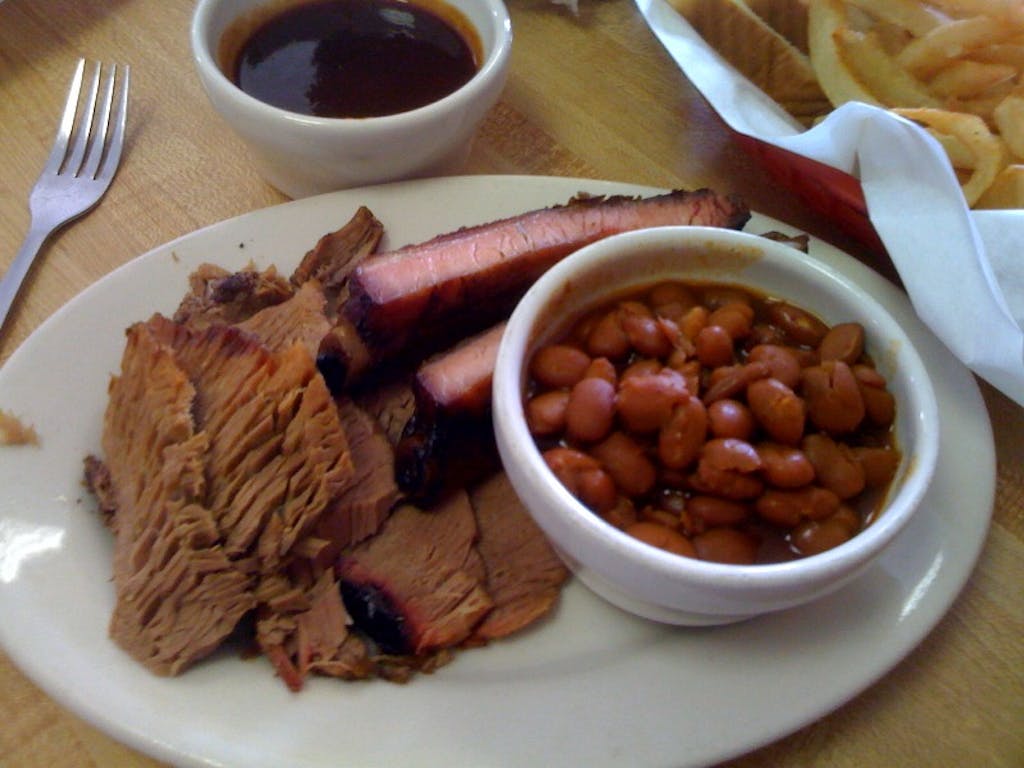
BM: Don’t feel bad about it. I have customers who don’t want any barbecue sauce, they just want a bowl of bean juice. I don’t do anything special, I just do it right.
DV: You’ve worked at Mac’s Bar-B-Que for a long time. Have you ever thought about doing something else?
BM: Well, I went to college, and I had a few odd jobs, but I’ve always been here. I still work another job. Would you guess I was a tech wizard?
DV: Not really.
BM: There’s a company in Sunnyvale that repairs high frequency amplifiers. I’m the only technician at this location that repairs the HF amplifiers right now.
DV: How many do you repair?
BM: I’ve had up to seven or eight in a week. I did two last week. It keeps me busy.
DV: Is it dangerous?
BM: You open the top on that amplifier. It’s got three thousand volts on it at one amp. That’s more than the electric chair. You have to understand what parts are hot and what parts are cold. It’s really my therapy from this place. One extreme to another.
DV: What other obscure hobbies do you have?
BM: I’m an avid ham radio user.
DV: How long have you been into ham radio?
BM: I got my first license in 1978 and I got real serious about it in 1984.
DV: What king of equipment do you have for this?
BM: In my backyard I have an eighty foot ham radio tower that’s made out of Rohn 55g, that’s a pretty heavy tower. The beam is a Mosley beam Pro 96-3-3. The boom on the beam is made of 3 inch diameter aircraft aluminum and it’s thirty-six feet long. I just installed an SAL-30 receiver antenna. It’s thirty-three feet long. Listen, I’m in the extreme 5% of the ham radio world. They have ham radio contests where you talk around the world. I have one next Friday. We start at 4:00pm until 7:00 the next morning. When the sun comes up this band dies away.
DV: What is the contest?
BM: It’s called CQ World Wide 160. The contest is to see how many stations you can work in a specific period.
DV: Have you done well in these contests?
BM: Yes. I’m thirteenth in North America. My call sign is AK5DX.
DV: How many serious entrants are there in North America?
BM: Two thousand, so I’m in the top 1%.
DV: Are you getting any barbecue knowledge from the Japanese?
BM: I’m not into sushi.
DV: How many more barbecue years do you think you have in you?
BM: I don’t know, but I’ll be glad when I leave. If I won the lottery I’d be closed the next day. I’ll let somebody else carry the torch for Dallas barbecue. We’ve been here for over thirty-one years. I just turned sixty, so I’ve spent half my life here in this building.
DV: Who’s going to carry the torch on here?
BM: Nobody. It’s a hard business with long hours. It’s not like a burger joint with all your toppings coming in already sliced and a griddle that you can just turn on the gas. The last day that I operate this I’ll go back to my dad’s 1955 prices for one day. Barbecue sandwich for thirty cents or a basket with fries for fifty-five cents. That will be my sign that I’m no longer gonna be here.


